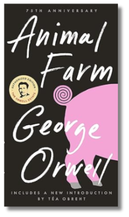Sentry Page Protection
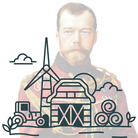
MR. JONES - Tsar Nicholas II.
The reader meets Mr. Jones in the very first paragraph where he is characterized as irresponsible. This irresponsibility is seen when he does not lock the hen house properly and goes to bed in a drunken stupor. His irresponsibility escalated because he had lost money in a lawsuit and took to drinking. The result of this is that he did not manage Manor Farm well, 'his men were idle and dishonest, the fields were full of weeds, the buildings wanted roofing, the hedges were neglected, and the animals were underfed.' (Orwell, 9). The (www.bulbsoup.com) last straw, for the animals, is when Mr. Jones goes to Willingdon, one Saturday, and gets so drunk that he does not return until Sunday. The animals remained unfed for that whole period, and when Mr. Jones returned, he went to sleep on the drawing-room sofa. These irresponsible actions led to the revolution. The theme of power and authority is highlighted in terms of abuse of this concept. Mr. Jones, in his capacity as the owner of Manor Farm, also owned his animals and therefore had power over them. With power comes responsibility, and Mr. Jones neglected his animals. This neglect of his responsibilities begs the question of whether or not he deserves the power and authority that he had over these animals, and the animals answered it by relieving him of his power.
The reader meets Mr. Jones in the very first paragraph where he is characterized as irresponsible. This irresponsibility is seen when he does not lock the hen house properly and goes to bed in a drunken stupor. His irresponsibility escalated because he had lost money in a lawsuit and took to drinking. The result of this is that he did not manage Manor Farm well, 'his men were idle and dishonest, the fields were full of weeds, the buildings wanted roofing, the hedges were neglected, and the animals were underfed.' (Orwell, 9). The (www.bulbsoup.com) last straw, for the animals, is when Mr. Jones goes to Willingdon, one Saturday, and gets so drunk that he does not return until Sunday. The animals remained unfed for that whole period, and when Mr. Jones returned, he went to sleep on the drawing-room sofa. These irresponsible actions led to the revolution. The theme of power and authority is highlighted in terms of abuse of this concept. Mr. Jones, in his capacity as the owner of Manor Farm, also owned his animals and therefore had power over them. With power comes responsibility, and Mr. Jones neglected his animals. This neglect of his responsibilities begs the question of whether or not he deserves the power and authority that he had over these animals, and the animals answered it by relieving him of his power.
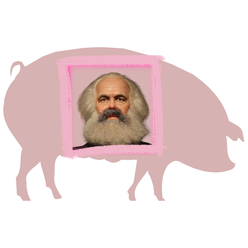
OLD MAJOR - Karl Marx.
The major characteristic that defines Old Major is his definitive nature. He holds his meeting with all the animals and directly, clearly, and concisely outlines his agenda. He informs them about his views on the relationship between Man and animals, which is (www.bulbsoup.com) an unequal one. He believes that Man takes everything from animals, and animals get only suffering and starvation in return. His manifesto is clear 'All men are enemies. All animals are comrades' (Orwell, 6). His speech ends with him teaching the animals a song, 'Beasts of England'. This song essentially speaks of the hope of being freed from the tyranny of men. The theme of power and authority is highlighted because the animals on Manor Farm have no power. They appear to be at the mercy of the whims and fancies of Mr. Jones. If he forgets to feed them, as he seems to do frequently, they do not eat. So Mr. Jones appears to hold all the power, which resulted in Old Major conceptualizing Animalism.
The major characteristic that defines Old Major is his definitive nature. He holds his meeting with all the animals and directly, clearly, and concisely outlines his agenda. He informs them about his views on the relationship between Man and animals, which is (www.bulbsoup.com) an unequal one. He believes that Man takes everything from animals, and animals get only suffering and starvation in return. His manifesto is clear 'All men are enemies. All animals are comrades' (Orwell, 6). His speech ends with him teaching the animals a song, 'Beasts of England'. This song essentially speaks of the hope of being freed from the tyranny of men. The theme of power and authority is highlighted because the animals on Manor Farm have no power. They appear to be at the mercy of the whims and fancies of Mr. Jones. If he forgets to feed them, as he seems to do frequently, they do not eat. So Mr. Jones appears to hold all the power, which resulted in Old Major conceptualizing Animalism.
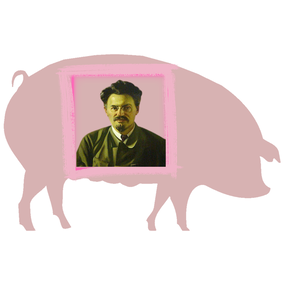
SNOWBALL -Leon Trotsky.
Snowball can be described as caring. He was the anti-politician, in that he actually wanted the best for the animals and, as a result, espoused the formulation of plans that ensured that the animals prospered. He organized the animals into Animal Committees, for example, the Clean Tails League for the cows and the Whiter Wool Movement for the sheep, along with instituting classes in reading and writing for all the animals. His most important contribution to Animalism, and therefore to the advancement of all animals, was the idea of the windmill. According to(www.bulbsoup.com) Snowball, the windmill 'could be made to operate a dynamo and supply the farm with electric power. This would light the stalls and warm them in winter, and would also run a circular saw, a chaff-cutter, a mangel-slicer and an electric milking machine' (Orwell, 21) This highlights Snowball's caring nature because he, essentially, used his intelligence to conjure up pictures of machines that would make the animals' lives easier. The result of Napoleon's plans is that the animals could graze at their ease in the fields or improve their minds with conversation and reading. Snowball's caring nature highlights the theme of power and authority. This is the case because Snowball has both power and authority over the animals on Animal Farm, and he chooses to use his powers for good. He chooses to advance the tenets of Animalism.
Snowball can be described as caring. He was the anti-politician, in that he actually wanted the best for the animals and, as a result, espoused the formulation of plans that ensured that the animals prospered. He organized the animals into Animal Committees, for example, the Clean Tails League for the cows and the Whiter Wool Movement for the sheep, along with instituting classes in reading and writing for all the animals. His most important contribution to Animalism, and therefore to the advancement of all animals, was the idea of the windmill. According to(www.bulbsoup.com) Snowball, the windmill 'could be made to operate a dynamo and supply the farm with electric power. This would light the stalls and warm them in winter, and would also run a circular saw, a chaff-cutter, a mangel-slicer and an electric milking machine' (Orwell, 21) This highlights Snowball's caring nature because he, essentially, used his intelligence to conjure up pictures of machines that would make the animals' lives easier. The result of Napoleon's plans is that the animals could graze at their ease in the fields or improve their minds with conversation and reading. Snowball's caring nature highlights the theme of power and authority. This is the case because Snowball has both power and authority over the animals on Animal Farm, and he chooses to use his powers for good. He chooses to advance the tenets of Animalism.
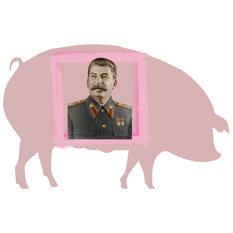
NAPOLEON - Joseph Stalin.
Napoleon can be described as power-hungry. Everything that he did, on Animal Farm, was with the end goal of forming a totalitarian government, with him at the top. He, unlike Snowball, believed that the education of the young was paramount because they could be guided in their thoughts, beliefs, and values. This ideology is highlighted when he takes the puppies from their mother and reared/ trained them in isolation, to become his private army. He later used these same dogs to run Snowball off (www.bulbsoup.com) the farm, because he was a threat to his dominance and power, and as a means of controlling the animals on Animal Farm. Napoleon was also manipulative. This tendency is highlighted in the manner in which he gaslighted the animals. The major victim of this was Clover, who constantly remembered that the seven commandments said one thing, but then heard that it said another, from Squealer. Napoleon, essentially, utilized Squealer as a propaganda agent. He would change aspects of the commandments, to fit his totalitarian agenda, and use Squealer to smooth things over with the animals, to convince them of the 'truth'. These examples highlight the theme of power and authority. This is the case because Napoleon's every action, while he was leader of Animal Farm was to gain, keep and maintain power for himself.
Napoleon can be described as power-hungry. Everything that he did, on Animal Farm, was with the end goal of forming a totalitarian government, with him at the top. He, unlike Snowball, believed that the education of the young was paramount because they could be guided in their thoughts, beliefs, and values. This ideology is highlighted when he takes the puppies from their mother and reared/ trained them in isolation, to become his private army. He later used these same dogs to run Snowball off (www.bulbsoup.com) the farm, because he was a threat to his dominance and power, and as a means of controlling the animals on Animal Farm. Napoleon was also manipulative. This tendency is highlighted in the manner in which he gaslighted the animals. The major victim of this was Clover, who constantly remembered that the seven commandments said one thing, but then heard that it said another, from Squealer. Napoleon, essentially, utilized Squealer as a propaganda agent. He would change aspects of the commandments, to fit his totalitarian agenda, and use Squealer to smooth things over with the animals, to convince them of the 'truth'. These examples highlight the theme of power and authority. This is the case because Napoleon's every action, while he was leader of Animal Farm was to gain, keep and maintain power for himself.
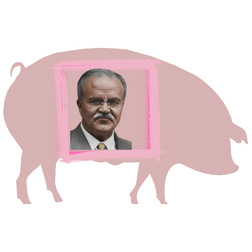
SQUEALER - Vyacheslav Molotov.
Squealer is Napoleon's manipulative propaganda agent. He, essentially, manipulates the animals on Animal Farm, on behalf of Napoleon. For example, the first time Napoleon let loose his dogs, he announced that Sunday morning meetings would come to an end, that all questions relating to the running of the farm would be settled by a special committee of pigs that he would preside over and that they would meet in private and communicate their decisions to the populace afterward. These are clear steps to initiate a totalitarian government because choice and autonomy are being taken from the animals, and even the animals themselves had a vague realization of this fact 'Several of them would have protested if they could have found the right arguments. Even Boxer was vaguely troubled.' (Orwell, 23). Napoleon, however, ensures that the animals are brainwashed by sending Squealer around the farm to 'explain' the new arrangements to the animals. Squealer's speech, in response to what was asked of him, reveals his manipulative nature:
'Comrades ... I trust that every animal here appreciates the sacrifice that Comrade Napoleon has made in taking this extra labour upon himself. Do not imagine, comrade, that leadership is a pleasure! On the contrary, it is a deep and heavy responsibility. No one believes more firmly than Comrade
Napoleon that all animals are equal. He would be only too happy to let you make your decisions for yourselves. But sometimes you might make the wrong decisions, comrades, and then where would we be?' ( Orwell, 23).
With this speech, Squealer places the animals in a state of powerlessness. They are like (www.bulbsoup.com) infants who need a benevolent 'big brother' to ensure that they function and this big brother, Napoleon, graciously takes on this arduous task. The themes that evolve from this are power and authority, deception, and language as power.
Squealer is Napoleon's manipulative propaganda agent. He, essentially, manipulates the animals on Animal Farm, on behalf of Napoleon. For example, the first time Napoleon let loose his dogs, he announced that Sunday morning meetings would come to an end, that all questions relating to the running of the farm would be settled by a special committee of pigs that he would preside over and that they would meet in private and communicate their decisions to the populace afterward. These are clear steps to initiate a totalitarian government because choice and autonomy are being taken from the animals, and even the animals themselves had a vague realization of this fact 'Several of them would have protested if they could have found the right arguments. Even Boxer was vaguely troubled.' (Orwell, 23). Napoleon, however, ensures that the animals are brainwashed by sending Squealer around the farm to 'explain' the new arrangements to the animals. Squealer's speech, in response to what was asked of him, reveals his manipulative nature:
'Comrades ... I trust that every animal here appreciates the sacrifice that Comrade Napoleon has made in taking this extra labour upon himself. Do not imagine, comrade, that leadership is a pleasure! On the contrary, it is a deep and heavy responsibility. No one believes more firmly than Comrade
Napoleon that all animals are equal. He would be only too happy to let you make your decisions for yourselves. But sometimes you might make the wrong decisions, comrades, and then where would we be?' ( Orwell, 23).
With this speech, Squealer places the animals in a state of powerlessness. They are like (www.bulbsoup.com) infants who need a benevolent 'big brother' to ensure that they function and this big brother, Napoleon, graciously takes on this arduous task. The themes that evolve from this are power and authority, deception, and language as power.
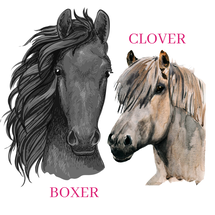
BOXER + CLOVER - Russian working class.
Both Boxer and Clover represent the Russian working class. This means that they are willing workers who fuel the Totalitarian government. This is seen in Boxer's total belief in Napoleon, proven by the phrase 'Napoleon is always right'. He is strong, loyal, and fought bravely against the humans, but he is not a very intelligent animal. Clover is, to a lesser degree, less fervent than Boxer because she can at least initially (www.bulbsoup.com) identify when she is being manipulated. This is seen when, after each amendment to the commandments is made, she has an inkling that something is wrong and goes to check the commandments. However, like Boxer, she is unintelligent, so she does not realize that changes were indeed made to the commandments. These traits highlight the theme of corruption.
Both Boxer and Clover represent the Russian working class. This means that they are willing workers who fuel the Totalitarian government. This is seen in Boxer's total belief in Napoleon, proven by the phrase 'Napoleon is always right'. He is strong, loyal, and fought bravely against the humans, but he is not a very intelligent animal. Clover is, to a lesser degree, less fervent than Boxer because she can at least initially (www.bulbsoup.com) identify when she is being manipulated. This is seen when, after each amendment to the commandments is made, she has an inkling that something is wrong and goes to check the commandments. However, like Boxer, she is unintelligent, so she does not realize that changes were indeed made to the commandments. These traits highlight the theme of corruption.
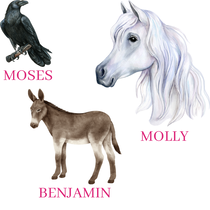
MOLLY + MOSES + BENJAMIN.
These minor characters have pivotal roles in the novel, based on who they represent. Molly represents the Russian bourgeoisie, so, in the context of Animal Farm, she had no issues with Mr. Jones. She was a pet who was coddled and felt secure under his leadership. Her discontent with Animalism was seen in the shirking of her duties and allowing one of Mr. Pilkington's men to talk to her and stroke her nose. She is seen as a frivolous animal who eventually runs away to find another human owner. Moses, in contrast, is quite an intentional and deliberate character. He represented the Russian Orthodox Church, at the time, and as such, he deliberately set out to ensure that the animals were content under whatever government ruled. He was Mr. Jones' pet raven who espoused the joys of working, with Sugarcandy Mountain as a reward. The pigs allowed Moses to remain on the newly named Animal Farm because he provided the same services for them, as he did for Mr. Jones, keeping the animals calm and content in their servitude. Benjamin is the final contrasting minor character. He is decisively neutral to the revolution. He simply does his tasks and no more, offering no opinions on the happenings of the day. With this attitude, he represents the elderly Russian populace. He has seen a lot, possibly seen a time before Old Major (donkeys live a long life), and realizes that nothing is new under the sun. His neutral attitude connects with the end of the novel, where Animal Farm reverts to Manor Farm, with the pigs replacing Mr. Jones. These traits highlight the theme of totalitarianism because these three animals support it in varying degrees.
These minor characters have pivotal roles in the novel, based on who they represent. Molly represents the Russian bourgeoisie, so, in the context of Animal Farm, she had no issues with Mr. Jones. She was a pet who was coddled and felt secure under his leadership. Her discontent with Animalism was seen in the shirking of her duties and allowing one of Mr. Pilkington's men to talk to her and stroke her nose. She is seen as a frivolous animal who eventually runs away to find another human owner. Moses, in contrast, is quite an intentional and deliberate character. He represented the Russian Orthodox Church, at the time, and as such, he deliberately set out to ensure that the animals were content under whatever government ruled. He was Mr. Jones' pet raven who espoused the joys of working, with Sugarcandy Mountain as a reward. The pigs allowed Moses to remain on the newly named Animal Farm because he provided the same services for them, as he did for Mr. Jones, keeping the animals calm and content in their servitude. Benjamin is the final contrasting minor character. He is decisively neutral to the revolution. He simply does his tasks and no more, offering no opinions on the happenings of the day. With this attitude, he represents the elderly Russian populace. He has seen a lot, possibly seen a time before Old Major (donkeys live a long life), and realizes that nothing is new under the sun. His neutral attitude connects with the end of the novel, where Animal Farm reverts to Manor Farm, with the pigs replacing Mr. Jones. These traits highlight the theme of totalitarianism because these three animals support it in varying degrees.
|
BEASTS OF ENGLAND
|
SEVEN COMMANDMENTS
|
Contributor: Leisa Samuels-Thomas
